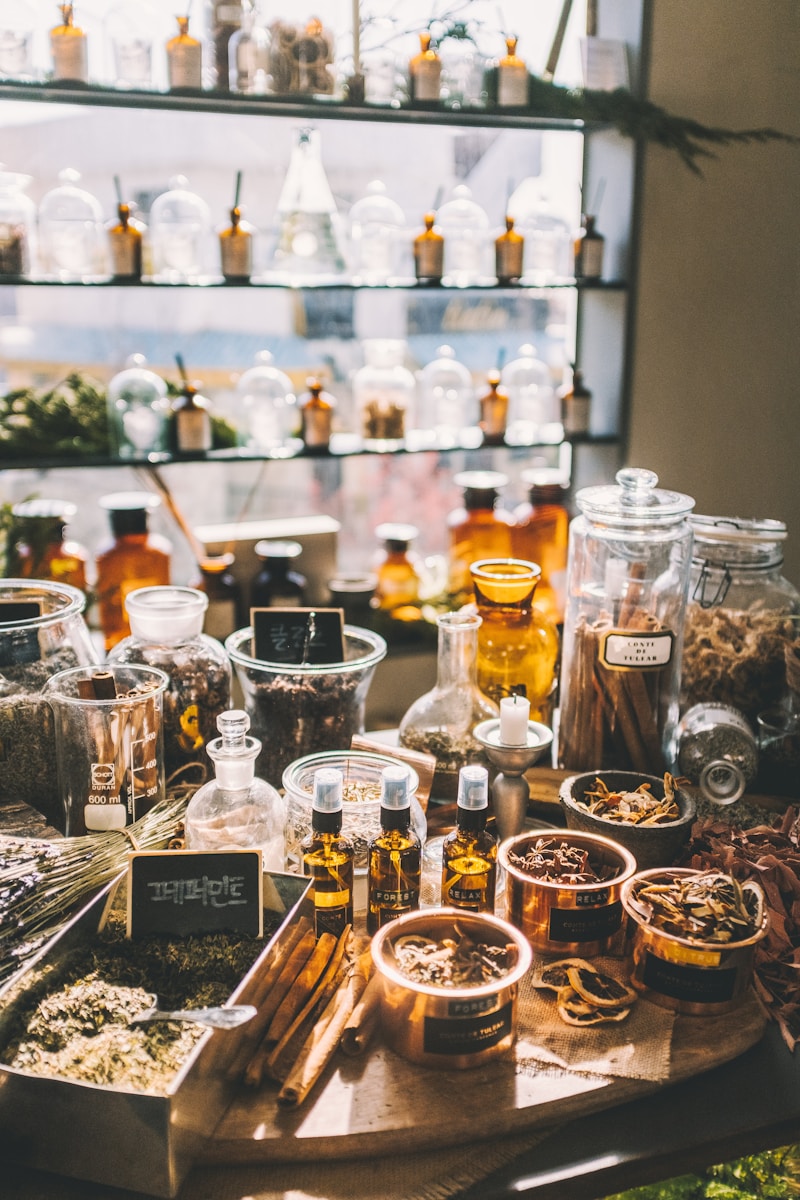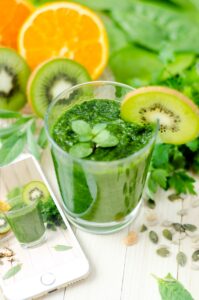TL;DR:
– Herbal medicine offers numerous benefits like immune support, stress relief, and pain management
– Echinacea boosts immunity, Chamomile aids in relaxation, and Turmeric reduces inflammation
– Integration into daily routines can be done through teas, diet, and natural first aid kits
– Keep in mind potential side effects, quality control, and medication interactions
– Modern research backs herbal medicine, highlighting sustainability and emerging trends
Certainly! Here’s an introduction in line with your requirements:
<h2>Introduction</h2><br>
Embark on a journey to wellness through the incredible world of Herbal Medicine. In our quest for holistic well-being, nature's bounty offers potent remedies that have been revered for centuries. As we delve into "Herbal Medicine: 5 Potent Remedies for Holistic Wellness," we uncover the profound healing powers that herbs hold. Drawing from the essence of nature, these remedies not only nurture our bodies but also soothe our souls. Join me as we explore the natural path to vitality and balance, where ancient wisdom meets modern harmony. Let's unlock the transformative potential of herbal medicine together.
Feel free to adjust the content to align more closely with your desired tone or style!
Benefits of Herbal Medicine
Have you ever wondered about the key benefits of using herbal medicine to enhance your well-being? Herbal remedies offer a natural and holistic approach to healing, providing a range of advantages compared to conventional medicine. Let’s explore how incorporating herbal medicine into your lifestyle can positively impact your health and wellness.
What are the key benefits of using herbal medicine?
- Herbal medicine is often gentler on the body, with fewer side effects compared to synthetic drugs.
- It promotes a holistic approach to healing, addressing not just symptoms but also underlying causes.
- Herbal remedies can support the body’s natural healing processes, boosting overall well-being.
How does herbal medicine compare to conventional medicine?
- Conventional medicine often focuses on treating symptoms, while herbal medicine looks at the body as a whole.
- Herbal remedies are derived from natural sources, making them a sustainable and eco-friendly choice.
- Many people find that herbal medicine offers a more personalized and individualized approach to health care.
Are there specific herbal remedies for common health issues?
- Yes, there are numerous herbal remedies for common ailments like colds, insomnia, digestive issues, and stress.
- Herbs like Echinacea, Chamomile, and Turmeric are known for their therapeutic properties and can help alleviate various health concerns.
- By exploring the world of herbal medicine, you can discover natural solutions to support your health and well-being.
Top 5 Herbal Remedies for Holistic Wellness
What is Echinacea and how can it benefit the immune system?
Echinacea is a powerful herb known for its immune-boosting properties. It helps to enhance the body’s natural defense mechanisms, making it more resistant to infections and illnesses. Echinacea is commonly used to prevent colds and flu and reduce the severity of symptoms if they occur. This herb stimulates the production of white blood cells, which play a crucial role in fighting off pathogens and maintaining overall health.
How can Chamomile help with relaxation and stress relief?
Chamomile is a gentle herb that is popular for its calming and soothing effects. It contains compounds that promote relaxation, reduce anxiety, and improve sleep quality. Chamomile tea is a popular way to enjoy the benefits of this herb, making it a perfect remedy for combating stress and promoting a sense of calm and well-being.
In what ways can Turmeric be used to reduce inflammation and pain?
Turmeric is a spice with potent anti-inflammatory properties due to its active compound, curcumin. It helps to reduce inflammation in the body, easing conditions like arthritis, muscle soreness, or joint pain. Turmeric can be consumed fresh, dried, or as a supplement to alleviate discomfort and improve overall well-being.
Stay tuned for more herbal remedies that can enhance your holistic wellness journey.
How to Incorporate Herbal Medicine Into Your Daily Routine
What are some easy ways to introduce herbal remedies into your diet?
Incorporating herbal remedies into your diet can be a simple and effective way to boost your wellness. Here are some easy ways to do so:
– Add fresh herbs like basil, parsley, or mint to your meals for extra flavor and health benefits.
– Enjoy herbal teas throughout the day, such as chamomile or peppermint tea, to relax or aid digestion.
– Use herbal infusions like ginger or turmeric in cooking to enhance the taste and health properties of your dishes.
Are there simple herbal teas or infusions you can make at home?
Absolutely! Making herbal teas and infusions at home is a wonderful way to enjoy the medicinal benefits of herbs. You can easily create teas by steeping herbs like lavender, echinacea, or lemongrass in hot water. Similarly, infuse herbs like rosemary, sage, or thyme in oil or vinegar for culinary purposes or topical use.
How can you create a natural first aid kit using herbal products?
Building a natural first aid kit with herbal products can be a proactive step towards holistic wellness. Consider including items like:
– Aloe vera gel for skin injuries or burns.
– Arnica cream for muscle soreness or bruising.
– Calendula ointment for minor cuts or scrapes.
– Lavender essential oil for stress relief or relaxation.
By incorporating herbal products into your first aid kit, you can address common health issues naturally and effectively.
Herbal Medicine Safety Precautions and Interactions
In the journey of holistic wellness, herbal medicine plays an essential role. However, like any other type of treatment or therapy, it’s crucial to be aware of the potential safety precautions and interactions that herbal remedies may have. It’s a common misconception that because these remedies are natural, they are inherently safe. This is not always the case, and they must be used responsibly and under proper guidance.
What potential side effects or risks should be considered when using herbal medicine?
Herbal medicine, while beneficial, can occasionally cause potential side effects. These can range from mild allergic reactions to more serious complications like liver damage or cardiovascular issues, particularly when used irresponsibly. Some herbs may also cause interactions with conventional drugs, leading to adverse effects or decreased effectiveness of the other medication.
How can you ensure the quality and purity of herbal products you purchase?
Establishing the authenticity and purity of the herbal products you purchase is important for safety. Prioritize reputable brands that provide transparency about ingredient sourcing, manufacturing process, and product testing. Certifications from independent bodies such as the US Pharmacopeial Convention can provide an additional assurance of quality.
Are there any known interactions between herbal remedies and medications?
Yes, some herbal remedies may interfere with the effectiveness of certain medications. For example, St. John’s Wort is known to interact with antidepressants, birth control pills, and certain heart medications, among others. It’s crucial to consult with a healthcare provider or certified herbalist before combining herbal remedies with any other medications.
The Future of Herbal Medicine
As we look ahead to the future of healthcare, the role of herbal medicine is gaining recognition and momentum. Modern research is shedding light on the potential benefits of herbal remedies, highlighting their unique healing properties and holistic approach to wellness.
How is modern research supporting the use of herbal medicine?
– Scientific studies are increasingly validating the efficacy of herbal medicine in treating various health conditions.
– Research is uncovering the chemical constituents of herbs that contribute to their therapeutic effects.
– Clinical trials are exploring the safety and effectiveness of herbal remedies in comparison to conventional medications.
What trends are emerging in the world of herbal remedies and natural healing?
– Integrative medicine practices are incorporating herbal medicine into mainstream healthcare.
– Sustainable sourcing and ethical harvesting of medicinal herbs are becoming key priorities.
– The rise of personalized medicine is driving the customization of herbal treatments based on individual needs and genetic profiles.
How can individuals contribute to the sustainability of herbal resources for future generations?
– Supporting organic farming practices and eco-friendly cultivation methods for medicinal plants.
– Promoting the conservation of endangered plant species through responsible harvesting and cultivation.
– Engaging in community initiatives that advocate for the preservation of herbal traditions and knowledge.
As we embrace the potential of herbal medicine in shaping the future of healthcare, it is essential for both individuals and healthcare systems to explore the diverse benefits and sustainable practices that herbal remedies offer. Join us in our journey towards a healthier and more holistic approach to wellness through the power of herbal medicine.
Next Up: Conclusion – Embracing a Holistic Wellness Lifestyle.
Conclusion:
In a world seeking holistic wellness, herbal medicine stands as a beacon of natural healing. The five potent remedies explored in this article shed light on the transformative power of Herbal Medicine in nurturing mind, body, and spirit. By embracing the wisdom of nature through Herbal Medicine, individuals can embark on a journey towards optimal well-being. Dive deeper into the realm of Herbal Medicine to unlock a treasure trove of wellness possibilities and embark on a path to vibrant health.










